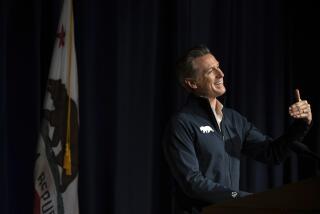Tiny Washington Towns Are Feeling Recession’s Pinch
- Share via
WASHTUCNA, Wash. — With wheat fortunes in decline and the state budget $1 billion in the red, this tiny farm town with a 124-year past may not have a future.
Mayor Neil Todd has raised the possibility that, come 2003--if the state balances its budget by cutting subsidies to local governments--Washtucna might cease to exist.
“I’m not hollering wolf. I just want some answers,” says Todd, mayor of Adams County’s oldest town for two years.
Across the country, recession has put a girdle on government funding, just as governments spend more on public safety and protecting critical infrastructure in a post-Sept. 11 world.
“We’re reading in state news every day where state budgets are being limited and being downsized because of a revenue loss,” says Deborah Rigsby, senior legislative counsel for the National League of Cities in Washington, D.C. “There’s a trickle-down effect.”
In Washington state, Boeing has made plans to lay off tens of thousands of workers since the Sept. 11 terrorist attacks, and many of those dot-coms have become dot-gones. But a pair of tax-limiting initiatives may be what has pushed several small towns in eastern Washington to the brink of extinction.
In 1999, voters repealed with Initiative 695 the state motor-vehicle excise tax, a portion of which had gone to local governments. The initiative was tossed out by the courts, but the Legislature responded to outraged voters and enacted a similar measure.
Flush with revenue from the booming economy along the Interstate 5 corridor, lawmakers also approved a subsidy for local governments, called the “695 backfill.”
But for 2003, Gov. Gary Locke has slashed the $84.6 million in backfill funds from his proposed budget.
Washtucna has an annual budget of just over $200,000, with about $22,000 in backfill funds. It’s a make-or-break amount of money, since so much of the town’s budget is dedicated to things like maintaining the sewer and water system.
Most of the 266 people of Washtucna seem to understand Todd’s dilemma. When the Town Council raised utility taxes 33% last year, only two people objected. Utility bills will go up 10% annually for the next five years.
“I’m desperately trying to restore our basic services,” he says.
The sewer-water tax hike is OK with Rebecca Thompson, who works at the recently reopened and renamed Pioneer General Store.
“You need towns like this,” she says. “I’d pay [higher] taxes to keep it going. I don’t want to see it die.”
But another anti-tax measure passed last year, I-747, limits property tax increases to 1% a year, unless local governments ask voters to approve more.
“I don’t see any more local tax as an option,” Todd says. “The majority of our community is low to moderate income.”
Washtucna has no police force. The town has one full-time employee and one part time. Todd makes $300 a month.
Grain silos dominate the skyline. There’s a drive-in restaurant, and Sonny’s Tavern, with its sign advertising “Good Food,” an espresso-flower shop-convenience store, and a bank. The little grocery store reopened Dec. 8 and needs a license before it can sell beer and cigarettes.
Much of Main Street is boarded up. The turn-of-the-century doctor’s house on the hill burned recently and probably won’t be rebuilt. No one was living there.
Jonnee Hays, 73, and her husband, Tom, moved to Washtucna after he saw an ad for a mechanic in the newspaper in Spokane, about 90 miles northeast of here.
“We came here to spend the winter,” she says. That was 54 years ago.
The downhill slide started as “the roads to the bigger towns got better. People started going to big towns for better prices for their commodities,” Hays says.
“One by one, the businesses started drifting away.”
Technological and global-market forces altered agriculture. Farming became more mechanized, bringing fewer people to town to work the fields or demand local services. Then, the federal government’s Conservation Reserve Program paid farmers not to plant their crops.
Washtucna is not alone. This may be the last hurrah for Harrah, Wapato, Benton City and several other small towns in eastern Washington, especially those without industry or a lot of merchandising to bring in property and sales taxes.
Todd wrote a letter seeking advice from Tim Eyman, the one-man machine behind the tax-limiting initiatives:
“My question is this: Where do I get the money to keep our community solvent? Are there taxes that we are not aware of? Is the Legislature stockpiling money that is not generally known to the public or local officials? I ask that you please enlighten me with viable options so that I can offer hope to the citizens of our small town.”
Eyman says he never received Todd’s letter, but when read the above paragraph, he responded: “Sounds pretty snotty. I don’t take it as an overly serious letter.”
Washtucna town government can always ask voters to approve higher taxes for local programs, Eyman says.
“Apparently, all he wants to do is whine,” Eyman says. “If he doesn’t feel up to the task as mayor, he can certainly resign.”
More to Read
Sign up for Essential California
The most important California stories and recommendations in your inbox every morning.
You may occasionally receive promotional content from the Los Angeles Times.













